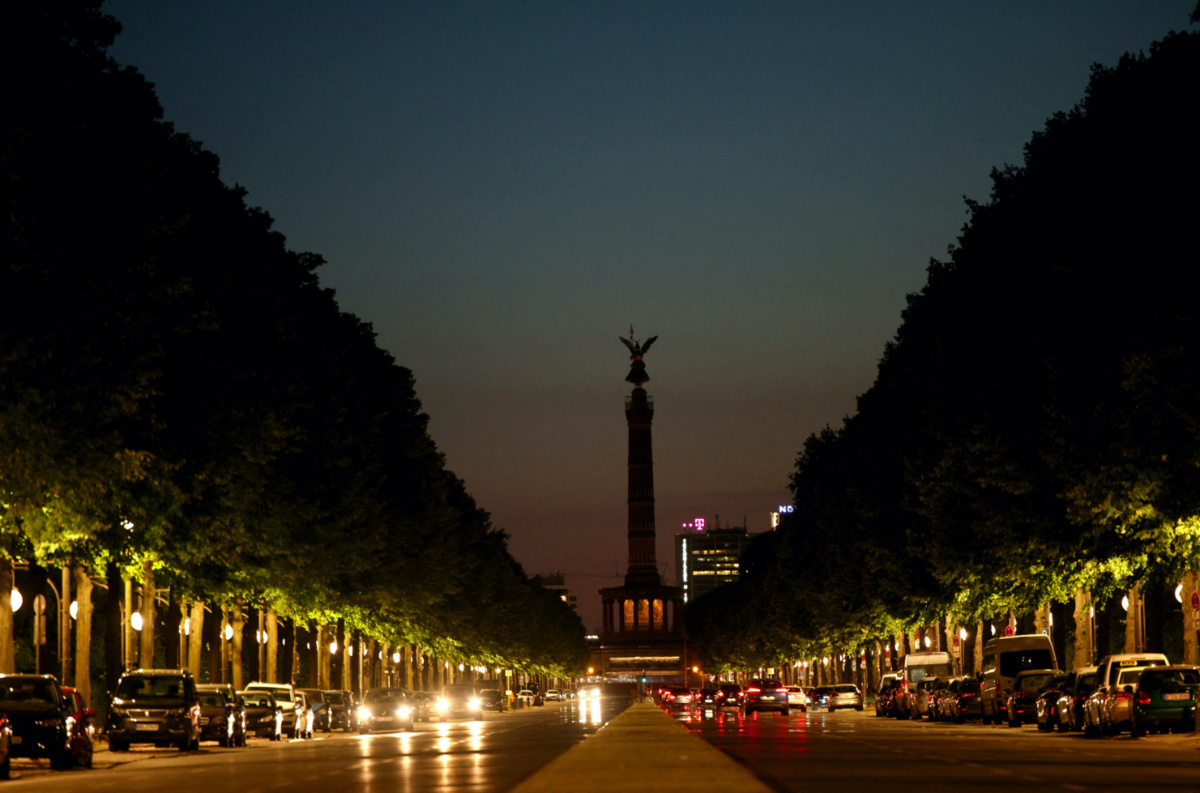Prague, Czech Republic
Reuters
Turning off lights, lowering thermostats and installing motion detectors are among the ways central European governments have begun energy saving, as part of efforts to trim costs and avoid shortages in the incoming heating season to address cuts in gas supplies from Russia.
Central Europe is vulnerable to the standoff with Russia, with some countries still dependent on Russian gas and all facing surging electricity prices across the continent.

Cars make their way along the 17th of June Street as the Victory Column shows a reduced lighting to save energy due to Russia’s invasion of Ukraine in Berlin, Germany on 6th August. PICTURE: Reuters/Lisi Niesner
The Czech Government announced on Thursday it was unscrewing half of lightbulbs at the government office and swapping remaining old bulbs for less-consuming LED sources. It was installing movement sensors to cut down lighting in corridors and turning off festive floodlights of the 19th century downtown Prague building.
Heating – normally around 22 degrees Celsius or even warmer in Czech offices – was being lowered to 19 to 20 degrees inside the government building, Prime Minister Petr Fiala said, and to 15 degrees in corridors.
“I will pressure mainly state institutions to lead by example,” Fiala told reporters. “We have adopted a package of measures…to save between 17 per cent and 20 per cent of necessary energy,” he said.
The presidential office said it would lower heating and turn off floodlights at the iconic Prague Castle and its cathedral at 10 pm instead of midnight, while the Industry Ministry cut down the number of refrigerators in use, among other measures.
In Hungary, the government has ordered state institutions and companies to reduce gas consumption by 25 per cent compared to the previous year, except for hospitals and social institutions.
Lights also will go off at Romania’s parliament palace, the second-largest building in the world after the US Pentagon, the parliament said earlier this month. Outdoor lights will be reduce by half and festive lighting will be cut to two hours per night.
The Polish Government instructed its various branches to reduce electricity consumption by 10 per cent.
After work, officials must turn off their computers and disconnect chargers, and they can only print necessary documents. At the Finance Ministry, the fountain was turned off and illumination of the building was limited to just two hours on weekends.
We rely on our readers to fund Sight's work - become a financial supporter today!
For more information, head to our Subscriber's page.
Warsaw is also replacing around 38,000 bulbs in street lamps with LEDs.
Those savings and various national cost caps and other support measures may still not be enough in places where heating or cooling is a large part of operations, such as universities or sports grounds.
Slovak universities have warned they will go to online schooling if the government does not provide more funding by mid-November.
In the Czech Republic, a survey of more than 500 sports clubs showed 61 per cent of those using indoor venues such as pools, ice rinks, gyms or inflatable halls were facing an “existential threat” as their energy costs have already risen by 135 per cent.
– With LUIZA ILIU in Bucharest, Romania, ANNA WLODARCZAK-SEMCZUK, ANNA KOPER and PAWEL FLORKIEWICZ in Warsaw, Poland, KRIZSTINA THAN in Budapest, Hungary.






